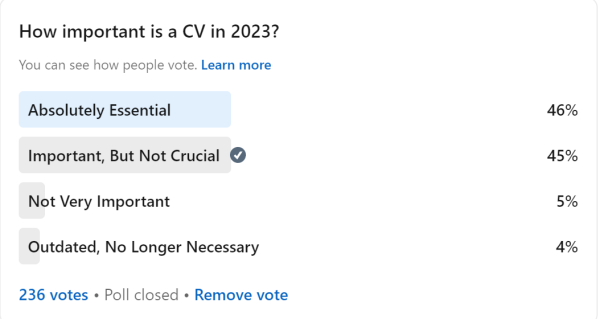If you'd asked me a decade ago about the role of the CV in the future, I might have speculated that by 2023, traditional CVs would be on the way out. However, a recent LinkedIn Poll I did suggests otherwise, and the findings are rather surprising.
Before I discuss the intricacies of this, let me share the results of the poll

I'll be honest; these results caught me off guard. I was gearing up to see the majority lean towards the 'not very important ' and 'outdated' categories. But it appears the humble CV still holds sway in today's job market.
Why are CVs Still Valued?
Drawing from my own experiences as a recruiter and reflecting on the market trends, CVs offer a standardized format that presents an individual's professional journey. They provide a snapshot of one's skills, experiences, and accomplishments.
While LinkedIn profiles and digital portfolios are becoming increasingly relevant, there's still something reassuring familiar about the trusty old CV. Perhaps it's the formality or the structure that a CV provides, making it easier for hiring managers and recruiters to quickly gauge a candidate's suitability.
Or perhaps it's just that people don't like change.
A Shift in Perception: The Evolution of the CV
Now, the nearly split result between 'Absolutely Essential' and 'Important, But Not Crucial' is a reflection of the evolving landscape. With the rise of platforms like LinkedIn, the need for a traditional CV has somewhat diminished. One can now showcase their skills, endorsements, publications, and even get recommendations in a more dynamic manner.
However, this doesn't make CVs redundant. It only changes their role in the recruitment process. While they used to be the only source of information, they're now complimented by other resources such as online profiles, portfolios or blogs.
The Minority Opinion: Is the CV Becoming Outdated?
I must admit, I thought the consensus here would be higher! With only a combined 9% of respondents suggesting the declining importance or redundancy of the CV.
With industries like IT, Design, and Multimedia; Portfolios, GitHub repositories, and case studies often speak louder than a traditional CV. Additionally, in some hiring models that focus more on skills-based evaluations, CVs may play a lesser role.
The Road Ahead: Where is the CV Headed?
The future of the CV might be a fusion of the traditional and the digital. Imagine a CV integrated with clickable links to projects, endorsements by peers and superiors, or even short video testimonials. The core structure may remain, but the interactive elements will evolve.
Emerging Technologies: The Challengers at the Gate
While CVs still hold ground, they're not without challengers. Here are a few cutting-edge technologies that might reshape or even threaten the traditional CV:
- AI-Powered Skill Assessment Tools: Platforms like CodinGame for developers allow companies to assess candidates based on actual skill sets rather than what's written on paper. The results? More accurate matches, less bias, and potentially, reduced reliance on CVs.
- Digital Portfolios with AR/VR Integration: Especially for fields like design, architecture, and multimedia, augmented and virtual reality portfolios can provide immersive experiences, showcasing a candidate's work in real-time environments. Why just read about a project when you can virtually walk through it?
- Video Resumes: Tools like Biteable and Vimeo allow for creative video resumes, offering a dynamic introduction to candidates, which can sometimes capture a candidate’s essence more than a static document.
- Blockchain Verified Credentials: With platforms like TrueRec by SAP, the future might see a shift to blockchain-backed CVs, ensuring that every credential, be it education or work experience, is verified and tamper-proof. This can eliminate the trust factor associated with traditional CVs.
CV's Evolution: Adapting to the New Age
Despite these advancements, the CV isn't vanishing – it's evolving. A modern CV might soon incorporate clickable links, multimedia snippets, AI-generated skill analysis charts, and perhaps even brief video introductions.
Conclusions
While I might have anticipated the demise of the CV, it’s evident that it's here to stay, albeit in a modified way. It remains a testament to an individual's professional journey. However, its role in the hiring process is undoubtedly shifting.
To all professionals out there: it's wise to keep your CV updated, but equally important to bolster your online professional profiles. As for recruiters and hiring managers, let’s adapt to the changing times, while still valuing the tried-and-tested methods that have served us well.
We're in a transition phase. The future might see the CV not as the primary introduction but as a comprehensive appendix to a candidate’s profile. After all, in a world that’s constantly evolving, adaptability is key.
